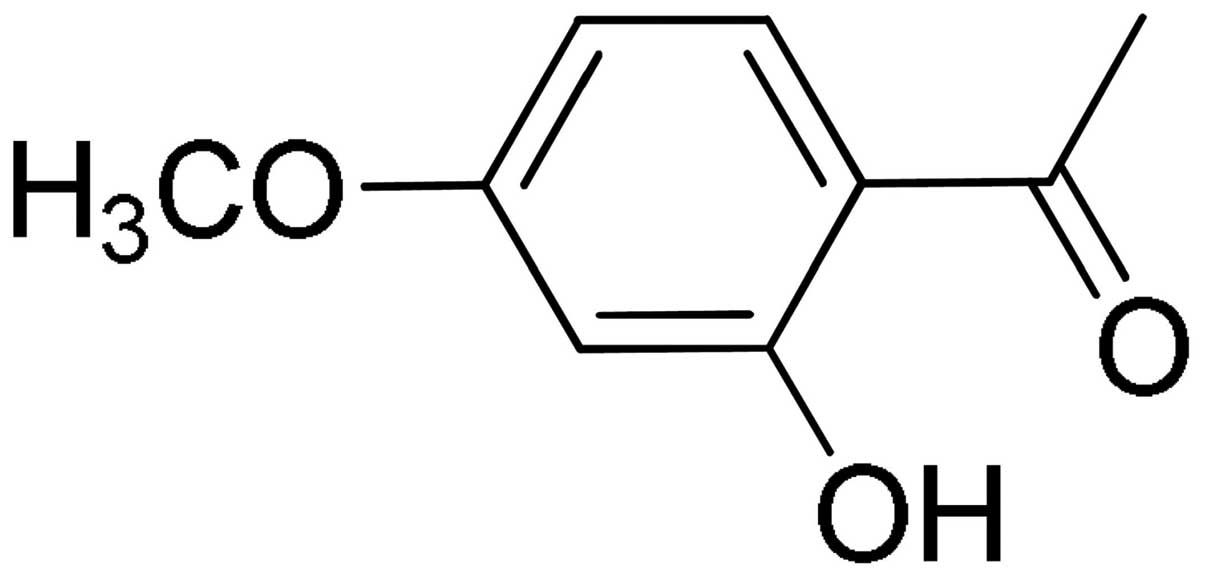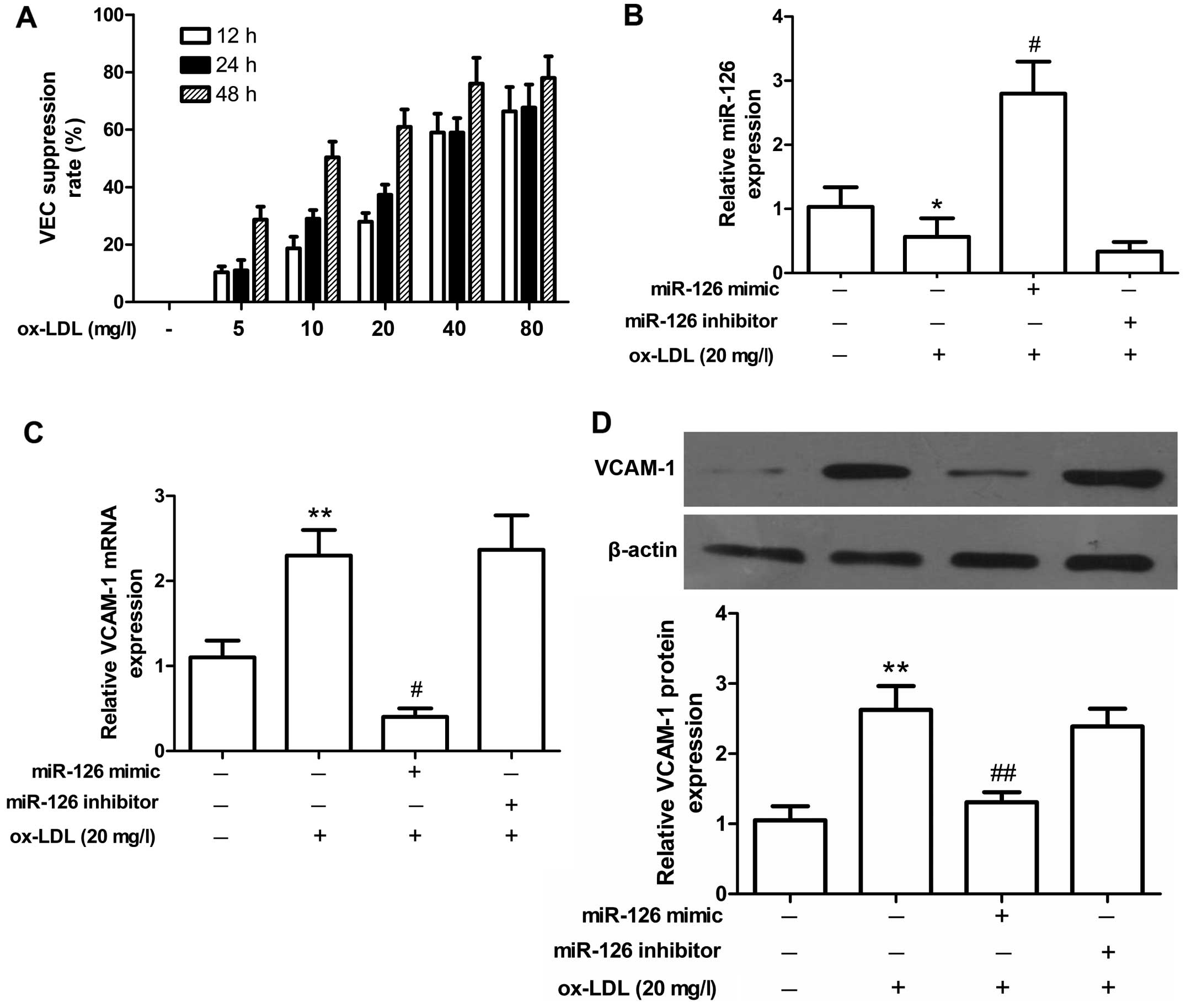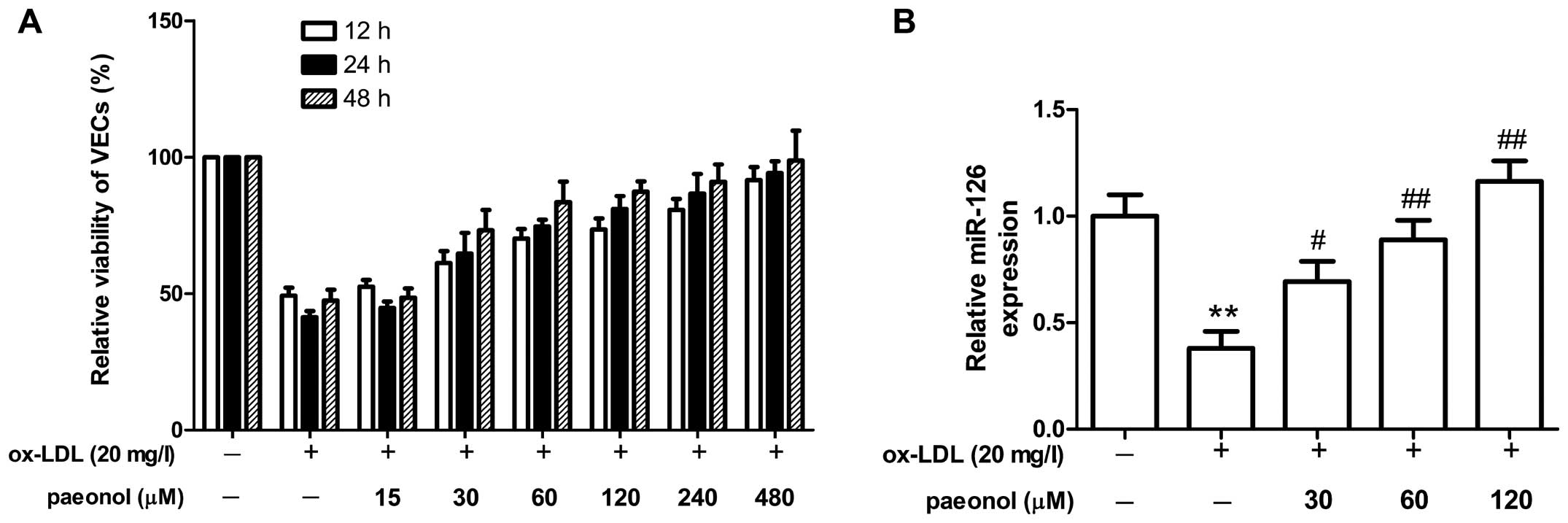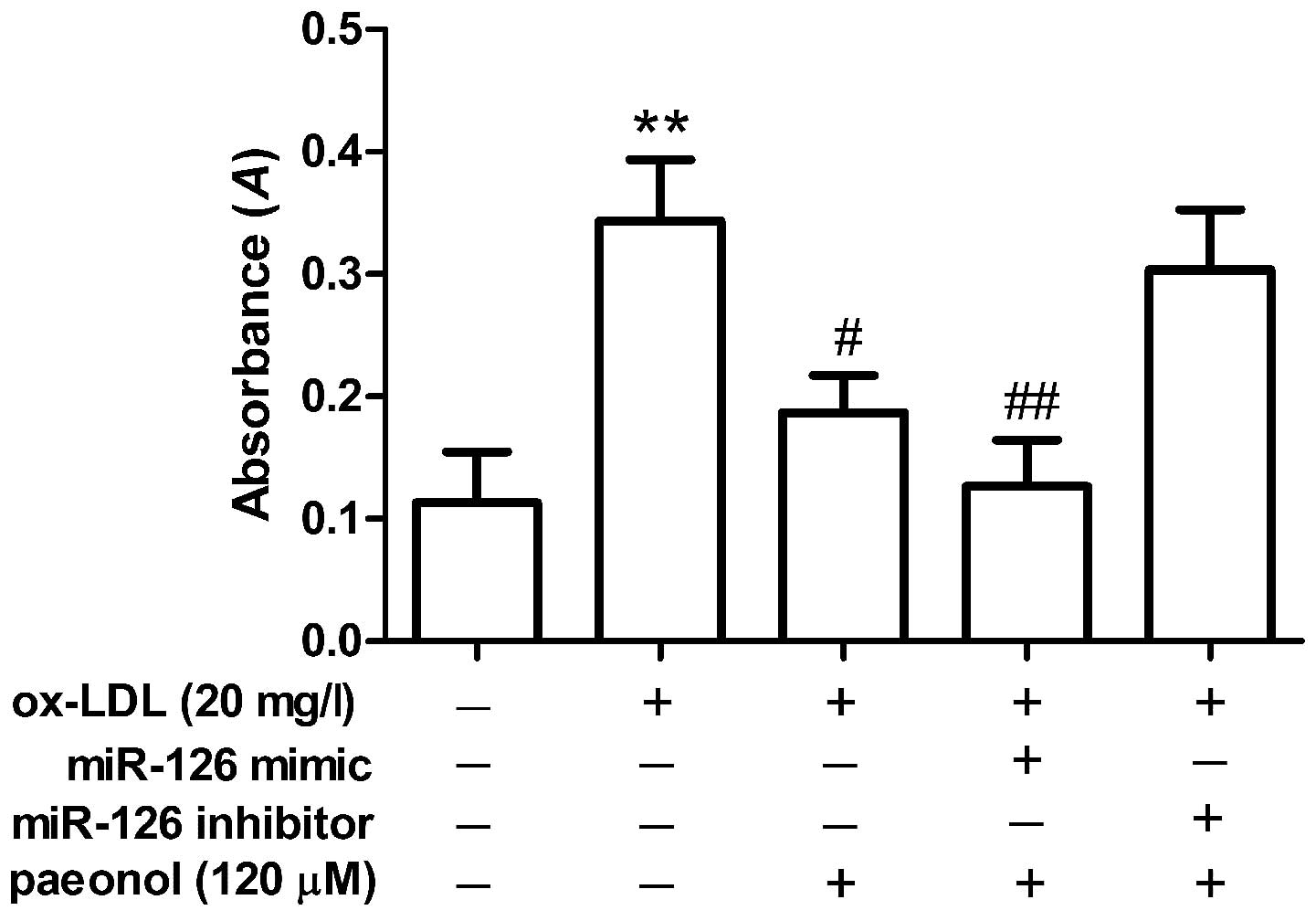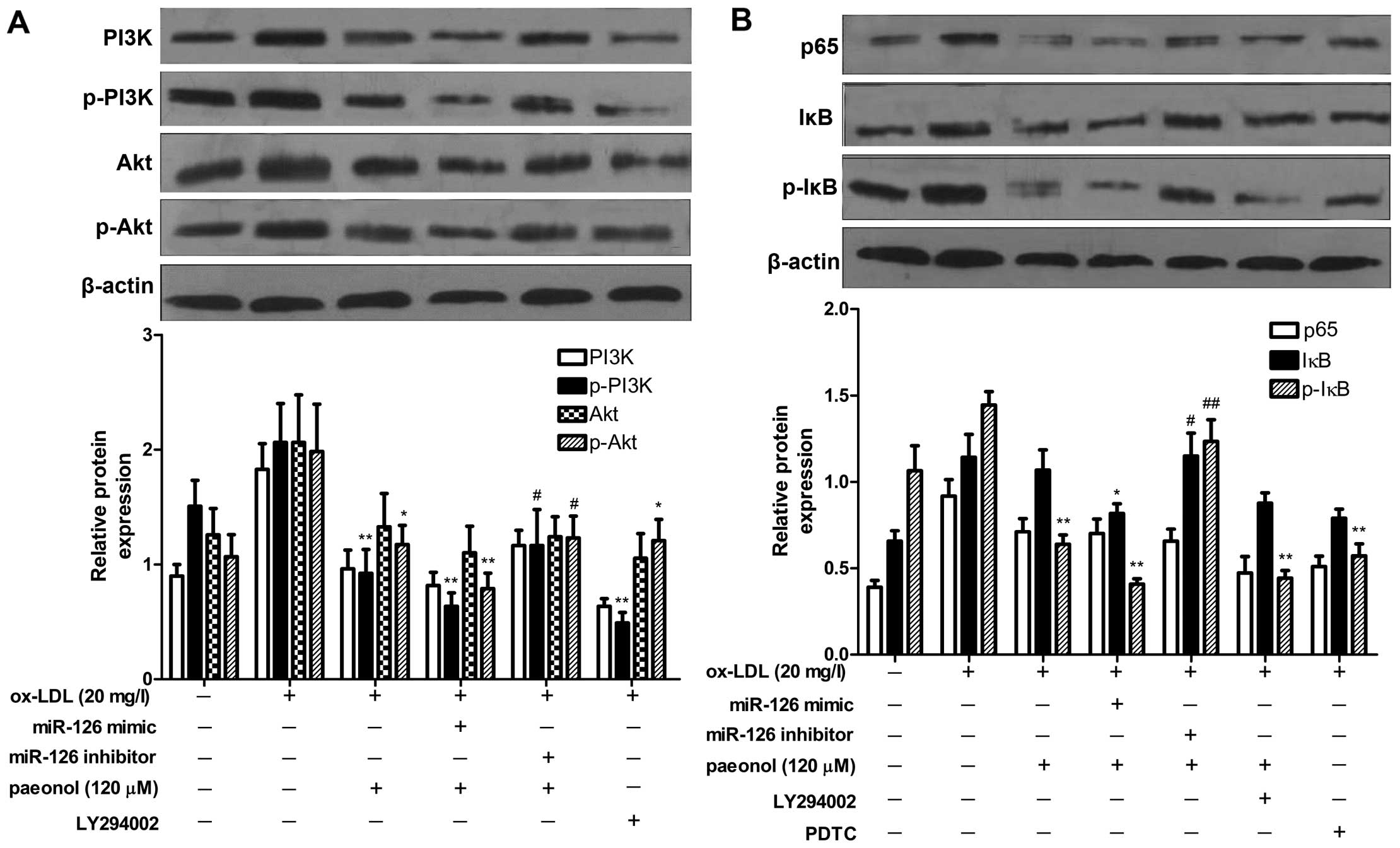|
1
|
Chou TC: Anti-inflammatory and analgesic
effects of paeonol in carrageenan-evoked thermal hyperalgesia. Br J
Pharmacol. 139:1146–1152. 2003. View Article : Google Scholar : PubMed/NCBI
|
|
2
|
Nizamutdinova IT, Jin YC, Kim JS, Yean MH,
Kang SS, Kim YS, Lee JH, Seo HG, Kim HJ and Chang KC: Paeonol and
paeoni-florin, the main active principles of Paeonia albiflora,
protect the heart from myocardial ischemia/reperfusion injury in
rats. Planta Med. 74:14–18. 2008. View Article : Google Scholar : PubMed/NCBI
|
|
3
|
Pan LL and Dai M: Paeonol from Paeonia
suffruticosa prevents TNF-alpha-induced monocytic cell adhesion to
rat aortic endothelial cells by suppression of VCAM-1 expression.
Phytomedicine. 16:1027–1032. 2009. View Article : Google Scholar : PubMed/NCBI
|
|
4
|
Hsieh CL, Cheng CY, Tsai TH, Lin IH, Liu
CH, Chiang SY, Lin JG, Lao CJ and Tang NY: Paeonol reduced cerebral
infarction involving the superoxide anion and microglia activation
in ischemia-reperfusion injured rats. J Ethnopharmacol.
106:208–215. 2006. View Article : Google Scholar : PubMed/NCBI
|
|
5
|
Su SY, Cheng CY, Tsai TH, Hsiang CY, Ho TY
and Hsieh CL: Paeonol attenuates H2O2-induced
NF-κB-associated amyloid precursor protein expression. Am J Chin
Med. 38:1171–1192. 2010. View Article : Google Scholar
|
|
6
|
Vitaglione P, Morisco F, Caporaso N and
Fogliano V: Dietary antioxidant compounds and liver health. Crit
Rev Food Sci Nutr. 44:575–586. 2004. View Article : Google Scholar
|
|
7
|
Li H, Dai M and Jia W: Paeonol attenuates
high-fat-diet-induced atherosclerosis in rabbits by
anti-inflammatory activity. Planta Med. 75:7–11. 2009. View Article : Google Scholar
|
|
8
|
Li W, Ishihara K, Yokota T, Nakagawa T,
Koyama N, Jin J, Mizuno-Horikawa Y, Wang X, Miyoshi E, Taniguchi N
and Kondo A: Reduced alpha4beta1 integrin/VCAM-1 interactions lead
to impaired pre-B cell repopulation in alpha 1,6-fucosyltransferase
deficient mice. Glycobiology. 18:114–124. 2008. View Article : Google Scholar
|
|
9
|
Hwa JS, Mun L, Kim HJ, Seo HG, Lee JH,
Kwak JH, Lee DU and Chang KC: Genipin selectively inhibits
TNF-α-activated VCAM-1 but not ICAM-1 expression by upregulation of
PPAR-γ in endothelial cells. Korean J Physiol Pharmacol.
15:157–162. 2011. View Article : Google Scholar : PubMed/NCBI
|
|
10
|
Tsoyi K, Kim WS, Kim YM, Kim HJ, Seo HG,
Lee JH, Yun-Choi HS and Chang KC: Upregulation of PTEN by CKD712, a
synthetic tetrahydroisoquinoline alkaloid, selectively inhibits
lipopolysaccharide-induced VCAM-1 but not ICAM-1 expression in
human endothelial cells. Atherosclerosis. 207:412–419. 2009.
View Article : Google Scholar : PubMed/NCBI
|
|
11
|
Harris TA, Yamakuchi M, Ferlito M, Mendell
JT and Lowenstein CJ: MicroRNA-126 regulates endothelial expression
of vascular cell adhesion molecule 1. Proc Natl Acad Sci USA.
105:1516–1521. 2008. View Article : Google Scholar : PubMed/NCBI
|
|
12
|
Sturgeon CM, Chicha L, Ditadi A, Zhou Q,
McGrath KE, Palis J, Hammond SM, Wang S, Olson EN and Keller G:
Primitive erythropoiesis is regulated by miR-126 via
nonhematopoietic VCAM-1+ cells. Dev Cell. 23:45–57.
2012. View Article : Google Scholar : PubMed/NCBI
|
|
13
|
Harris TA, Yamakuchi M, Kondo M, Oettgen P
and Lowenstein CJ: Ets-1 and Ets-2 regulate the expression of
microRNA-126 in endothelial cells. Arterioscler Thromb Vasc Biol.
30:1990–1997. 2010. View Article : Google Scholar : PubMed/NCBI
|
|
14
|
Nikolic I, Plate KH and Schmidt MH: EGFL7
meets miRNA-126: An angiogenesis alliance. J Angiogenes Res.
2:92010. View Article : Google Scholar : PubMed/NCBI
|
|
15
|
Bai Y, Bai X, Wang Z, Zhang X, Ruan C and
Miao J: MicroRNA-126 inhibits ischemia-induced retinal
neovascularization via regulating angiogenic growth factors. Exp
Mol Pathol. 91:471–477. 2011. View Article : Google Scholar : PubMed/NCBI
|
|
16
|
Sui L, Wang J and Li BM: Role of the
phosphoinositide 3-kinase-Akt-mammalian target of the rapamycin
signaling pathway in long-term potentiation and trace fear
conditioning memory in rat medial prefrontal cortex. Learn Mem.
15:762–776. 2008. View Article : Google Scholar : PubMed/NCBI
|
|
17
|
Tsubosaka Y, Murata T, Yamada K, Uemura D,
Hori M and Ozaki H: Halichlorine reduces monocyte adhesion to
endothelium through the suppression of nuclear factor-kappaB
activation. J Pharmacol Sci. 113:208–213. 2010. View Article : Google Scholar : PubMed/NCBI
|
|
18
|
Ghosh S, Banerjee S and Sil PC: The
beneficial role of curcumin on inflammation, diabetes and
neurodegenerative disease: A recent update. Food Chem Toxicol.
83:111–124. 2015. View Article : Google Scholar : PubMed/NCBI
|
|
19
|
Salvayre R, Auge N, Benoist H and
Negre-Salvayre A: Oxidized low-density lipoprotein-induced
apoptosis. Biochim Biophys Acta. 1585:213–221. 2002. View Article : Google Scholar
|
|
20
|
Basoni C, Nobles M, Grimshaw A, Desgranges
C, Davies D, Perretti M, Kramer IM and Genot E: Inhibitory control
of TGF-beta1 on the activation of Rap1, CD11b, and transendothelial
migration of leukocytes. FASEB J. 19:822–824. 2005.PubMed/NCBI
|
|
21
|
Asgeirsdóttir SA, van Solingen C, Kurniati
NF, Zwiers PJ, Heeringa P, van Meurs M, Satchell SC, Saleem MA,
Mathieson PW, Banas B, et al: MicroRNA-126 contributes to renal
microvascular heterogeneity of VCAM-1 protein expression in acute
inflammation. Am J Physiol Renal Physiol. 302:F1630–F1639. 2012.
View Article : Google Scholar : PubMed/NCBI
|
|
22
|
Rioufol G, Finet G, Ginon I, André-Fouët
X, Rossi R, Vialle E, Desjoyaux E, Convert G, Huret JF and Tabib A:
Multiple atherosclerotic plaque rupture in acute coronary syndrome:
A three-vessel intravascular ultrasound study. Circulation.
106:804–808. 2002. View Article : Google Scholar : PubMed/NCBI
|
|
23
|
Peng N, Meng N, Wang S, Zhao F, Zhao J, Su
L, Zhang S, Zhang Y, Zhao B and Miao J: An activator of mTOR
inhibits oxLDL-induced autophagy and apoptosis in vascular
endothelial cells and restricts atherosclerosis in apolipoprotein
E−/− mice. Sci Rep. 4:55192014.
|
|
24
|
Fuentes E, Palomo I and Alarcón M:
Platelet miRNAs and cardiovascular diseases. Life Sci. 133:29–44.
2015. View Article : Google Scholar : PubMed/NCBI
|
|
25
|
Condorelli G, Latronico MV and Cavarretta
E: microRNAs in cardiovascular diseases: Current knowledge and the
road ahead. J Am Coll Cardiol. 63:2177–2187. 2014. View Article : Google Scholar : PubMed/NCBI
|
|
26
|
Angel-Morales G, Noratto G and
Mertens-Talcott SU: Standardized curcuminoid extract (Curcuma longa
L.) decreases gene expression related to inflammation and interacts
with associated microRNAs in human umbilical vein endothelial cells
(HUVEC). Food Funct. 3:1286–1293. 2012. View Article : Google Scholar : PubMed/NCBI
|
|
27
|
Wang S, Aurora AB, Johnson BA, Qi X,
McAnally J, Hill JA, Richardson JA, Bassel-Duby R and Olson EN: The
endothelial-specific microRNA miR-126 governs vascular integrity
and angiogenesis. Dev Cell. 15:261–271. 2008. View Article : Google Scholar : PubMed/NCBI
|
|
28
|
Cybulsky MI, Iiyama K, Li H, Zhu S, Chen
M, Iiyama M, Davis V, Gutierrez-Ramos JC, Connelly PW and Milstone
DS: A major role for VCAM-1, but not ICAM-1, in early
atherosclerosis. J Clin Invest. 107:1255–1262. 2001. View Article : Google Scholar : PubMed/NCBI
|
|
29
|
Libby P: Inflammation in atherosclerosis.
Nature. 420:868–874. 2002. View Article : Google Scholar : PubMed/NCBI
|
|
30
|
Croft D, McIntyre P, Wibulswas A and
Kramer I: Sustained elevated levels of VCAM-1 in cultured
fibroblast-like synoviocytes can be achieved by TNF-alpha in
combination with either IL-4 or IL-13 through increased mRNA
stability. Am J Pathol. 154:1149–1158. 1999. View Article : Google Scholar : PubMed/NCBI
|
|
31
|
Hayden MS and Ghosh S: Signaling to
NF-kappaB. Genes Dev. 18:2195–2224. 2004. View Article : Google Scholar : PubMed/NCBI
|
|
32
|
Albelda SM, Smith CW and Ward PA: Adhesion
molecules and inflammatory injury. FASEB J. 8:504–512.
1994.PubMed/NCBI
|
|
33
|
Lockyer JM, Colladay JS, Alperin-Lea WL,
Hammond T and Buda AJ: Inhibition of nuclear factor-kappaB-mediated
adhesion molecule expression in human endothelial cells. Circ Res.
82:314–320. 1998. View Article : Google Scholar : PubMed/NCBI
|
|
34
|
Yang M, Huang J, Pan HZ and Jin J:
Triptolide overcomes dexamethasone resistance and enhanced
PS-341-induced apoptosis via PI3k/Akt/NF-κB pathways in human
multiple myeloma cells. Int J Mol Med. 22:489–496. 2008.PubMed/NCBI
|
|
35
|
Wang XC, Du LQ, Tian LL, Wu HL, Jiang XY,
Zhang H, Li DG, Wang YY, Wu HY, She Y, et al: Expression and
function of miRNA in postoperative radiotherapy sensitive and
resistant patients of non-small cell lung cancer. Lung Cancer.
72:92–99. 2011. View Article : Google Scholar
|
|
36
|
Guo C, Sah JF, Beard L, Willson JK,
Markowitz SD and Guda K: The noncoding RNA, miR-126, suppresses the
growth of neoplastic cells by targeting phosphatidylinositol
3-kinase signaling and is frequently lost in colon cancers. Genes
Chromosomes Cancer. 47:939–946. 2008. View Article : Google Scholar : PubMed/NCBI
|
|
37
|
Fish JE, Santoro MM, Morton SU, Yu S, Yeh
RF, Wythe JD, Ivey KN, Bruneau BG, Stainier DY and Srivastava D:
miR-126 regulates angiogenic signaling and vascular integrity. Dev
Cell. 15:272–284. 2008. View Article : Google Scholar : PubMed/NCBI
|
|
38
|
Sessa R, Seano G, di Blasio L, Gagliardi
PA, Isella C, Medico E, Cotelli F, Bussolino F and Primo L: The
miR-126 regulates angiopoietin-1 signaling and vessel maturation by
targeting p85β. Biochim Biophys Acta. 1823:1925–1935. 2012.
View Article : Google Scholar : PubMed/NCBI
|















